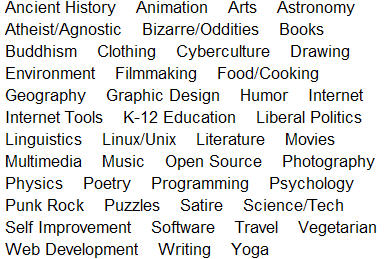Sometimes I regret finding so many things interesting.
You see, I grew up in a part of the country that was extremely remote and sparsely populated, with little cultural diversity, in an era before cable, VCRs, and of course the internet. The majority of my teachers, bless them, were clearly there for the hunting and the summers off. In other words, intellectual stimulation was not a feature of my childhood.

Years later, after some lucky breaks and the support and guidance of some extraordinary people, I find myself doing work that is rewarding and stimulating. Especially stimulating. The internet has given me the freedom to explore everything that intrigues me.
All of this became apparent as I updated my StumbleUpon profile.
It’s as though a genie had poofed out of a lamp and given me the ability to visit the best web sites available on any subject. And unlike the genie from One Thousand and One Nights, I’m given not three wishes but 127.
There is the rub!

I started with major interests, and realized that I’d checked more categories than I’d left blank. As I dug deeper into each, I was stopped at 127 interests, with the depths of many categories left unplumbed. The word cloud above shows the major selections only.
My first bosses were a pair of brilliant advertising entrepreneurs. One had a degree in history, the other, journalism. Together they showed me the power a person grounded in the Humanities could have in the business world.
They too were cultural omnivores.
I thought of them this evening as I ticked off the many areas of study I wished I had an entire lifetime to explore.
Tonight I might skip sleep. Again. I may just stay up and drink deeply from the well of StumbleUpon, a magical servant who feeds that little boy whose thirst for knowledge insists on being quenched.
